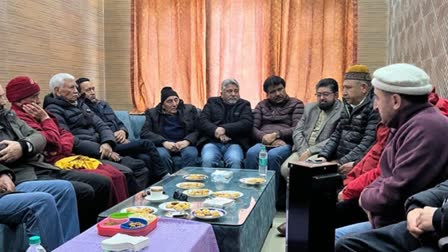Srinagar (Jammu and Kashmir): A delegation of political and social representatives of the Ladakh Union Territory on Monday met Union Minister of State for Home Affairs Nityanand Rai in Delhi to demand statehood and other reservations under the 6th Schedule. Sources said that the 14-member delegation led by the Leh Apex Bpdy (LAB) and Kargil Democratic Alliance (KDA) have put forward four point demands including Sixth Schedule, statehood, one Lok Sabha seat each for Leh and Kargil and constitution of a Public Service Commission for advertising job opportunities for the locals.
"Our meeting with MoS (home) concluded just now. He gave a patient hearing and listened to our demands. Our hope is alive. There will be the next round of talks with the center soon," Kargil Democratic Alliance (KDA) member and a well-known socio-political leader of Kargil district Sajjad Kargili told ETV Bharat from Delhi. Echoing similar views, Leh Apex Body (LAB) executive member and former minister Chering Dorge said, "We have put forward our demands before him.
He listened to all our demands but did not give any response. But assured us that there will be a second meeting on the matter." The Central government, led by Prime Minister Narendra Modi, split Jammu and Kashmir into two Union Territories on August 5, 2019 and established Ladakh as a new union territory.
The decision saddened the people of Kargil, while the people of Leh rejoiced at the Centre's move. However after becoming a union territory, Leh and Kargil together staged several protests to put pressure on the Centre for their long-standing demands. The LAB and KDA have four points on their agenda: statehood for Ladakh, two Lok Sabha seats (one for Kargil and one for Leh), job opportunities for residents, and constitutional protections under the Sixth Schedule.
Additionally, they have called for the creation of a Ladakh Public Service Commission (PSC). The alliance has also stated that, in the event that this is not possible, Ladakh should be incorporated into the PSC of Jammu and Kashmir, following the format established by the High Court of Jammu and Kashmir and Ladakh.
